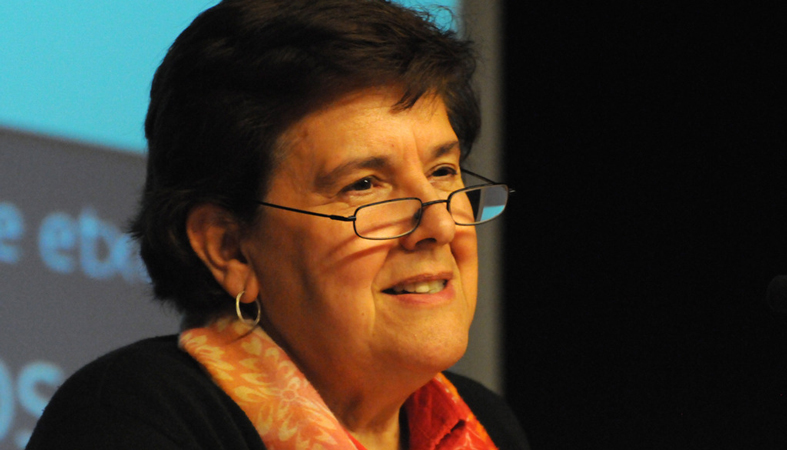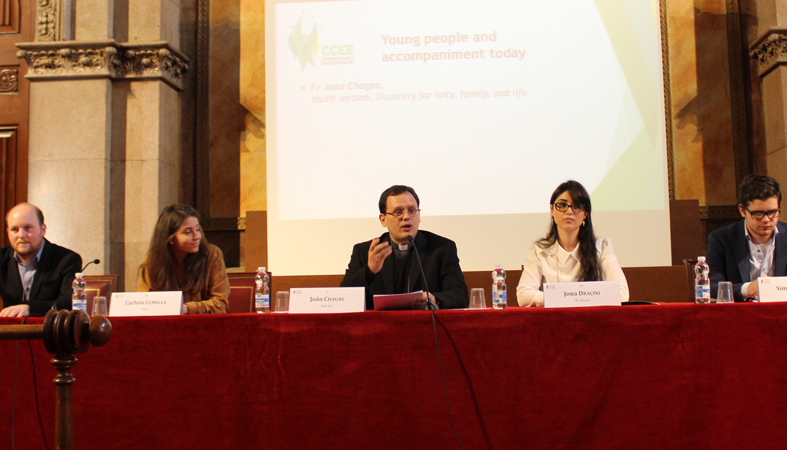
Sister Lola Arrieta, Carmelite Sister of the Caridad...
The text of Sr. Lola Arrieta, Carmelite Sister of the Caridad de Vedruna, expert in...
0 +41 71 227 6040
+41 71 227 6040
 ccee@ccee.eu
ccee@ccee.eu

Good morning! My name is Mate Szaplonczay. I am a Greek Catholic seminarist from Hungary. This is my last year in the seminary, so I am in the beautiful situation of being still accompanied and of having to be ready for accompanying others at the same time. I consider the accompaniment to be very important in general and in my personal life as well.
I am sure that my balanced relationship with God, and my vocation are thanks to the Holy Spirit, to God’s mercy, and to the people who accompanied me during my whole journey. I would like to talk briefly about my good experiences and thoughts about accompaniment.
I will try to organize them in some points.
Sometimes it seems to be not efficient to accompany a young person without the support of their relationships. Most of the cases in the contemporary Europe the family background doesn’t help youth to find the true meaning of their lives. It might be because there are more and more wounded families, or, for example in the post-soviet countries like Albania or Hungary a whole generation grew up without religion. Since not all the schools are religious, we have to create good parish groups and communities, where they can find precious friends, with whom they can support each other to a better way. I’d like to notice here, that the disciples of Emmaus were two of them, and I suppose they supported each other.
Don Bosco said: “Consider important what they think to be important, and then they will consider important what you think to be important.”
It is very rare that a young person goes to the church or to a religious communion by his own. We have to go among them. We have to go out, we have to go and bring the message of Jesus to others – as Pope Francis said explaining that the Good News is meant to be shared, not stored away. I would like to tell a good example to you. There is an initiation in Hungary called Central Point (Közös Pont). This is an ecumenical mission of the Catholic Church in cooperation with the Lutheran and Calvinist Churches, which is about pre-evangelization on the bigger music festivals. There are at least eighty-hundred thousand young people on these festivals, and we created a space where they can come in anytime, and where they are listened. When I first participated in this mission I was surprised how many of them came in to talk. Most of the incomers were atheist or indifferent, and we had a lot good experiences. Some of them came back in the following years, there were some who told that they were looking for this tent directly. There I was able to feel what pre-evangelization means.
My personal experience is that work can bring people closer to each other. I am happy to see all the initiatives which involve volunteers. I and other young people tend to say that we are exhausted and overloaded. But don’t believe us! We have a lot of power and fuel inside, we are just lazy sometimes. But if we discover our stores, we will admit that these opportunities are important and precious, because all the youth can have a common goal to achieve, and the team-work can make them feel that they are connected, and that they have responsibilities for each other. I have a good example of my area in this topic: the Camp Saint Damien. The story of it goes back to the 90’s, when several seminarists decided to pray for disabled people together every day of the year. A few years later they organized a camp for 20 disabled children, and by now we have more than 200 disabled participants each summer with the help of more than 400 volunteers, who are not only take part in the Camp on the summer, but during the whole year there are weekly praying occasions for the participants.
Each young person is unique and all of them need a special care. They can feel if it doesn’t come from your heart. A good human relation is necessary for the accompaniment. Let me cite Don Bosco again: “Young people must not only be loved; but they must know they are loved”.
Conclusion
An other quotation which – I think – summarizes very well the meaning of accompanying young people:
“For you I study, for you I work, for you I live and for you I am willing to give my life.” (Don Bosco)
At the end of my speech, I’d like to quote the sentence of the disciples of Emmaus:
“Were not our hearts burning within us, while he talked with us?”
May the Holy Spirit help us to get the heart of the youth burning within them!
Thank You for listening!